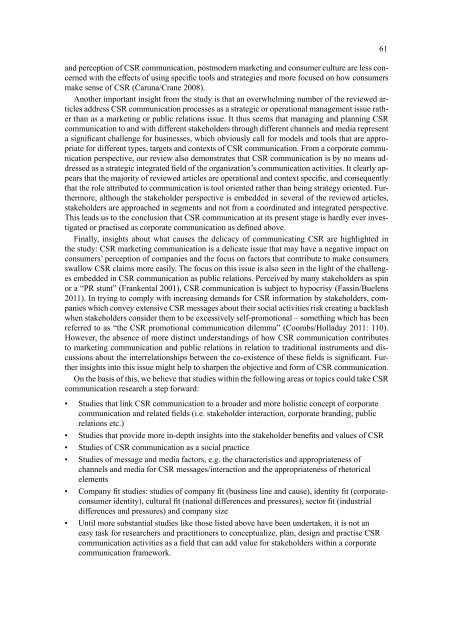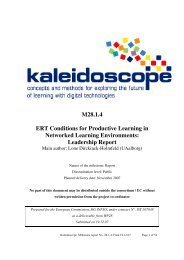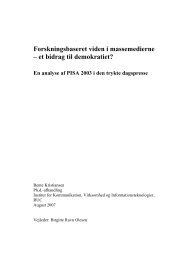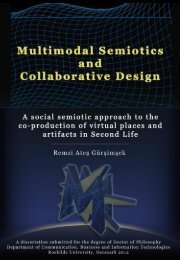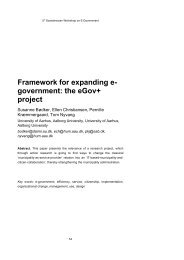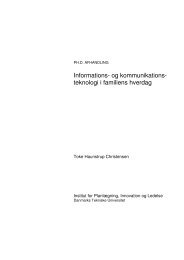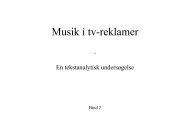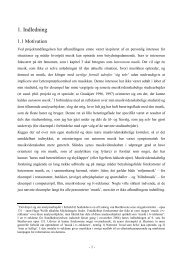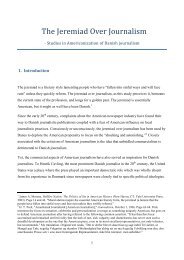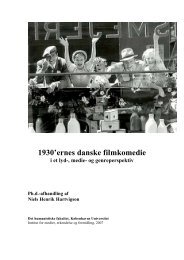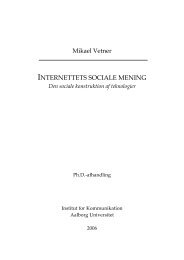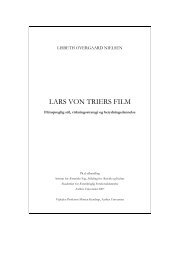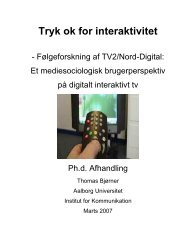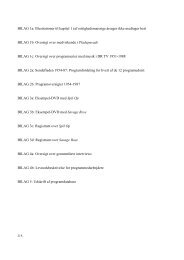Download - Hermes - Journal of Linguistics
Download - Hermes - Journal of Linguistics
Download - Hermes - Journal of Linguistics
You also want an ePaper? Increase the reach of your titles
YUMPU automatically turns print PDFs into web optimized ePapers that Google loves.
and perception <strong>of</strong> CSR communication, postmodern marketing and consumer culture are less concerned<br />
with the effects <strong>of</strong> using specific tools and strategies and more focused on how consumers<br />
make sense <strong>of</strong> CSR (Caruna/Crane 2008).<br />
Another important insight from the study is that an overwhelming number <strong>of</strong> the reviewed articles<br />
address CSR communication processes as a strategic or operational management issue rather<br />
than as a marketing or public relations issue. It thus seems that managing and planning CSR<br />
communication to and with different stakeholders through different channels and media represent<br />
a significant challenge for businesses, which obviously call for models and tools that are appropriate<br />
for different types, targets and contexts <strong>of</strong> CSR communication. From a corporate communication<br />
perspective, our review also demonstrates that CSR communication is by no means addressed<br />
as a strategic integrated field <strong>of</strong> the organization’s communication activities. It clearly appears<br />
that the majority <strong>of</strong> reviewed articles are operational and context specific, and consequently<br />
that the role attributed to communication is tool oriented rather than being strategy oriented. Furthermore,<br />
although the stakeholder perspective is embedded in several <strong>of</strong> the reviewed articles,<br />
stakeholders are approached in segments and not from a coordinated and integrated perspective.<br />
This leads us to the conclusion that CSR communication at its present stage is hardly ever investigated<br />
or practised as corporate communication as defined above.<br />
Finally, insights about what causes the delicacy <strong>of</strong> communicating CSR are highlighted in<br />
the study: CSR marketing communication is a delicate issue that may have a negative impact on<br />
consumers’ perception <strong>of</strong> companies and the focus on factors that contribute to make consumers<br />
swallow CSR claims more easily. The focus on this issue is also seen in the light <strong>of</strong> the challenges<br />
embedded in CSR communication as public relations. Perceived by many stakeholders as spin<br />
or a “PR stunt” (Frankental 2001), CSR communication is subject to hypocrisy (Fassin/Buelens<br />
2011). In trying to comply with increasing demands for CSR information by stakeholders, companies<br />
which convey extensive CSR messages about their social activities risk creating a backlash<br />
when stakeholders consider them to be excessively self-promotional – something which has been<br />
referred to as “the CSR promotional communication dilemma” (Coombs/Holladay 2011: 110).<br />
However, the absence <strong>of</strong> more distinct understandings <strong>of</strong> how CSR communication contributes<br />
to marketing communication and public relations in relation to traditional instruments and discussions<br />
about the interrelationships between the co-existence <strong>of</strong> these fields is significant. Further<br />
insights into this issue might help to sharpen the objective and form <strong>of</strong> CSR communication.<br />
On the basis <strong>of</strong> this, we believe that studies within the following areas or topics could take CSR<br />
communication research a step forward:<br />
• Studies that link CSR communication to a broader and more holistic concept <strong>of</strong> corporate<br />
communication and related fields (i.e. stakeholder interaction, corporate branding, public<br />
relations etc.)<br />
• Studies that provide more in-depth insights into the stakeholder benefits and values <strong>of</strong> CSR<br />
• Studies <strong>of</strong> CSR communication as a social practice<br />
• Studies <strong>of</strong> message and media factors, e.g. the characteristics and appropriateness <strong>of</strong><br />
channels and media for CSR messages/interaction and the appropriateness <strong>of</strong> rhetorical<br />
elements<br />
• Company fit studies: studies <strong>of</strong> company fit (business line and cause), identity fit (corporateconsumer<br />
identity), cultural fit (national differences and pressures), sector fit (industrial<br />
differences and pressures) and company size<br />
• Until more substantial studies like those listed above have been undertaken, it is not an<br />
easy task for researchers and practitioners to conceptualize, plan, design and practise CSR<br />
communication activities as a field that can add value for stakeholders within a corporate<br />
communication framework.<br />
61


